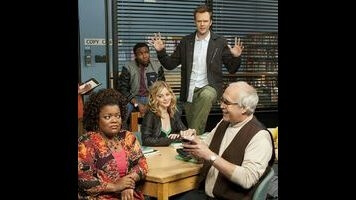Community: "Social Psychology"

In the past couple of weeks, the Internets have been swarmed by people arguing vociferously in comments boards (other than this one, for some reason) over whether or not Community or Modern Family is the big new comedy of the fall. Modern Family has the highest Metacritic score for a new show this fall, the (relatively) big ratings and the buzz in the mainstream media, mostly stemming from Ty Burrell’s performance. Community, however, has scrappy underdog appeal, a premise that hasn’t been done a million times before and a much better comedy lineup surrounding it, what with the much-improved Parks & Recreation, The Office and – next week, people! – 30 Rock. Somehow, as with all things on the Internet, the people who are really into this argument can’t get behind the idea that there are TWO great new comedies on this season (I know … I find it hard to believe too). So instead of saying, “They’re both great!” comments boards are erupting in battles that vaguely resemble the build-up to World War I. I’d say, “Can’t we all just get along?” but I think the partisans of both shows also miss just how much the two shows resemble each other.
Take this week’s episodes of Modern Family and Community as a case in point. Both shows are doing the yeoman’s work of deepening their ensembles, making sure that all of the characters can pull their weight both dramatically and laughs-wise. The best comedies not only have a wide variety of good characters but a wide variety of different relationships between those characters. Modern Family, this week, used the kids as a way to get at some of the things that make its adult characters tick, sending the different characters’ kids into unfamiliar households to open up the parents there in new ways. Now, I don’t want to imply anything too harsh here about Abed, but Community seems intent on using him in a similar fashion. If “Introduction to Film” was the episode that let us see just what makes him so guileless, “Social Psychology” continues the attempts to use him to reveal just what makes all of the other characters tick.
It’s not a bad strategy. Abed is just so open and trusting that he becomes essentially childlike, meaning that the other characters feel a weird sense of both revulsion and protectiveness toward him. This allows them to open up to him in a way they might not to one of the other characters. The thing that makes me the most hopeful for Community’s future is the fact that it keeps shuffling around which characters share storylines with which other characters, giving everyone a chance to get some screen time with someone else. This is the second week in a row that Jeff has had an important storyline but not the A story, and that means that Community is intent on deepening its ensemble, something that indicates it has thought about its long-term future more than the constrained premise might make it seem. Part of shuffling the characters around like this means that Abed is always paired off with someone new, and that can allow that character to show the new sorts of colors Abed usually allows to appear.
This week, the series paired off Abed with Annie, a character whose been one of the less-defined characters on the show so far, despite the fine work Alison Brie is doing making her a nice riff on the smart girl who realizes that the real world is a trickier place than a classroom. While “Social Psychology” doesn’t radically change that portrayal of her, placing her in a situation where she desperately wants to win a teacher’s favor and then has Abed get between her and that favor, creating a situation where her tightly-wound persona finally explodes. Brie has played the character as such a time bomb all this time that when she finally just lets it all fly out of her, you can sense the frustration inherent in her personality, the girl who could have had it all and is now reduced to begging and scraping her way into an experiment conducted by a pompous ass.
 Keep scrolling for more great stories.
Keep scrolling for more great stories.
